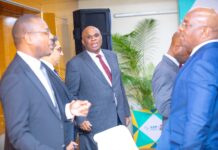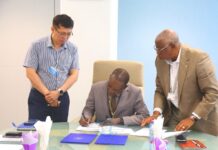This year’s Youth School was held in Accra, and was interactive and participatory. It was designed to generate tangible outcomes through resourcing the youth to demonstrate their skills and expertise in the creation of solutions targetted at solving specific industry-inspired problems.
The welcome address was given by Prof. Samuel Amponsah, HOD-Distance Education, on behalf of Prof. Olivia A. Kwapong, Dean-School of Continuing and Distance Education. Prof Peeter Normak, Director-Tullinn University School of Digital Technologies, and Prof. Indrek Grauberg, Director-TLU School of Governance, Law and Society, both delivered an address on global perspectives of emerging technologies in education, looking at the challenges and way forward.
A panel session moderated by Dr. James Sunney Quaicoe had panellists like Assistant Prof. Linda Helene Sillat, Head-Centre for Education Technology, Tallinn University-Estonia; Dr. Catlyn Kirna, Lecturer-School of Governance, Law and Society; Claudius B. Angsongna, President-GRASAG; Dr. Isaias Barreto da Rosa, UNESCO Representative-Democratic Republic of the Congo/Tallinn University Alumnus; and Solomon Adjei, President-Association of Ghana Startups, discussed emerging technologies in education.
The panel discussed why technologies should be part of the education and training of students; the ethical consideration to be considered by stakeholders when it comes to utilization or implementation of emerging technologies in education; how teachers must be well-equipped to navigate and utilise technologies for pedagogical innovation – looking at what global and local frameworks could be designed to support, sustain and optimise the technologies available, or leapfrog to embrace the emerging ones. The panel ended by providing practical local, regional and national measures that can be taken to ensure students from diverse socio-economic backgrounds gain access to technology.
Clement Odjidja-Odjao of the UG Debating Team gave an address to the youth – the leaders now. The International Leadership Foundation took participants through one leadership and development study for High School syndicates, and the Youth Leadership, resilience, creativity and sustainable development goals for Tertiary and working youth.
Mammie Hutchful Nortey, on behalf of the E.D. Jack Dotsey, gave the closing remarks. The entire day’s programme was facilitated by Madam Baptista S. Gebu. Accra High School Choir thrilled participants with melodies of authentic Ghanaian songs that inspired the audience to dance in consonance.
The New Year School and Conference is an annual event that brings together academics, policymakers, business leaders, civil society organisations and other stakeholders to discuss critical issues affecting Ghana and Africa as a whole. In 2021, the Youth School was introduced as a key feature of the Annual New Year School and Conference. The driving force behind this inclusion was to ensure voices of the youth and their insights are captured in the dialogue, while empowering them with relevant skills to challenge the status quo and equip them for impact. The fast-paced evolution of technology and industry demands a new generation of problem-solvers and innovators.
Usually, the Youth School adopts the theme and objectives set for the year and designs a one-day interactive programme targetted at high school and tertiary-level students. Building on the theme of Nurturing Resilience: Adopting Technology and Embracing Humanism for Sustainable Development in Ghana, the Youth School discussed emerging technologies. The Youth School also celebrated the 75 years of impact from the University of Ghana’s Annual New Year School and Conference – a flagship project of the School of Continuing and Distance Education (SCDE), College of Education usually organised in collaboration with various partners and institutions.










